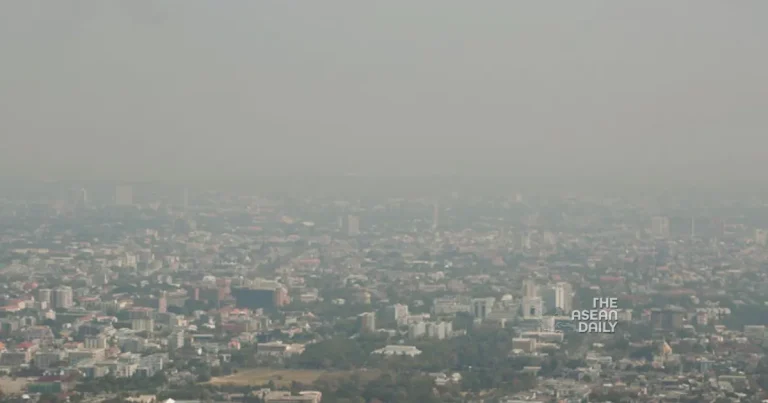15-3-2024 (CHIANG MAI) The popular tourist destination of Chiang Mai in Thailand was enveloped in thick smog on March 15, leaving residents and visitors struggling to breathe in the hazardous air. The city ranked first on air monitoring website IQAir’s list of the world’s most polluted cities on that day.
Levels of PM2.5 pollutants, which are tiny particles capable of entering the bloodstream and causing cancer, were classified as “very unhealthy” and exceeded the World Health Organization’s annual guideline by over 35 times.
Amidst the smog, Kamol, a 62-year-old orange seller at Warorot Market, expressed his concerns, stating, “It’s very high. All I have is this mask, which is the same one I used for Covid.” Former Thai Prime Minister Thaksin Shinawatra, recently released early from a jail sentence, wore a face mask during his visit to the market on March 15, where he posed for photos with well-wishers.
Chiang Mai often experiences high levels of pollution, particularly during the early months of the year when farmers engage in land-clearing practices by burning crops. Forest fires and exhaust fumes further exacerbate the problem. Recognizing the health implications, the Thai government took some action by approving a Clean Air Act in January. Prime Minister Srettha Thavisin is scheduled to visit Chiang Mai on March 15 and is expected to meet with organizations addressing forest fires on the following day.
However, Chiang Mai residents, like Kamol, expressed their disappointment, stating that they have not received any assistance. Kamol, concerned about his respiratory health, said, “I need to get my health checked every year, especially for respiratory diseases.”
A government agency issued a warning in March, emphasizing the need for more official action, as it estimated that at least 10 million people would require treatment for pollution-related health issues by 2023.
“The pollution is always high, especially this time of year,” remarked Sariya, a 50-year-old shopper in Chiang Mai. She added, “There is nothing we can do about it since it’s always high.” Sariya also highlighted the city’s geographical location, nestled between hills, which exacerbates the problem by trapping the toxic smog.
Despite the alarming pollution levels, tourists seemed undeterred as they strolled through the streets of Chiang Mai on March 15. Andy, a 32-year-old Chinese tourist visiting from Chengdu, stated, “I’m not afraid of the pollution,” citing similar air quality issues in his home country. He simply enjoyed the city for its beauty. Guillaume Tieufri, a 44-year-old French programmer, echoed this sentiment, saying that the pollution had not spoiled his four-day trip and that people should continue to live their lives despite the challenges.
The impact of the persistent pollution levels has been felt in the tourism industry, with international visitors discouraged from visiting in 2023, leading to despair among vendors and cancellations of bookings by domestic tourists, as warned by the Thai Hotel Association Northern Chapter. However, on March 15, tourists appeared unfazed by the smog, continuing to explore the city’s attractions.




